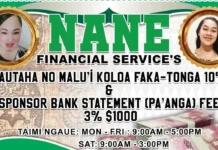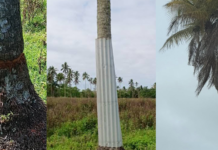President Trump’s executive order banning birthright citizenship of babies born to many temporary residents of the United States could affect thousands of Tongans living in that country.
As the order currently faces a series of legal challenges that may ultimately lead to a court battle, various experts have begun to analyze and share their insights on the potential consequences of this situation.
The decision could affect not just those who are in the country illegally but also those babies born to women living legally, but temporarily, in the United States — such as people studying on a student visa or workers hired by high-tech companies.
These babies will not automatically be recognized by the federal government as U.S. citizens if the father is also not a permanent resident.
Trump told federal departments, according to a Time report, “to deny the right known as birthright citizenship from children born to mothers and fathers in the country unlawfully. Under his order, it would also deny citizenship to children born to parents in the U.S. on work or study visas, tourism visas, or when neither parent is a U.S. citizen or permanent resident. The order could impact who is granted passports, social security numbers, and certificates of citizenship. If it stands, the changes would go into effect on Feb. 19”.
Reuters’ report on the matter said: “Trump’s order declared that individuals born in the United States are not entitled to automatic citizenship if the mother who was in the country unlawfully and the father was not a citizen or lawful permanent resident. It also declared citizenship would be denied to those whose mother was in the United States lawfully but temporarily, such as those on student or tourist visas, and whose father was not a citizen or lawful permanent resident”.
A report by the New York Times said that there are serious questions about how Trump makes the move since the citizenship of babies born in the United States is documented in a two-step process.
“First, the state or territorial government will issue a birth certificate confirming where and when the birth took place. The birth certificate does not include any information about the immigration status of the baby’s parents.
Second, when that baby (or the parents, on the child’s behalf) applies for a passport, the birth certificate showing that the baby was born on U.S. soil is enough to prove citizenship. No other documentation is required”.
If birthright citizenship were to be limited or eliminated, many Tongan newborns in the States could face uncertainty regarding their citizenship status.
This is because most of their parents who have just arrived in the States were on temporary visas such as student and work visas and visiting visas.
There were reports of about 10,000 undocumented Tongans in the States.
This change could affect their children’s legal rights and access to education, healthcare, and government services.
Tongans in the USA
There are approximately 78,871 Tongans in the United States.
A 2014 study of Tongans in the country by Amy Cooper found that “From 2001 through 2010, an annual average of 300 Tongans obtained legal permanent residence in the United States; most were immediate relatives of Tongans already living there”.
It also said: “During those same years, more than 3,000 Tongans were admitted annually as temporary workers”.
The report also mentioned that many Tongans came to the United States via a Mormon Church initiative, which offered immigrants “student and work visas and the chance for Tongans of marriageable age to meet spouses.”







